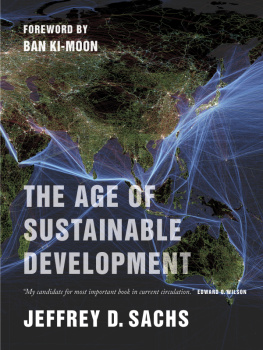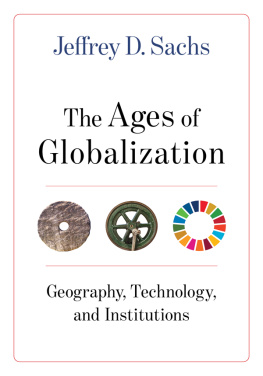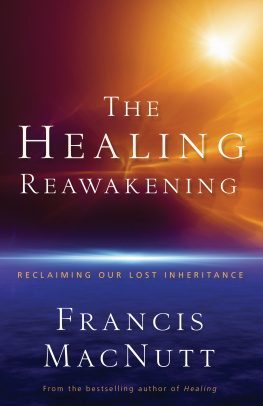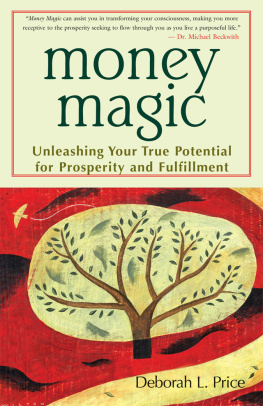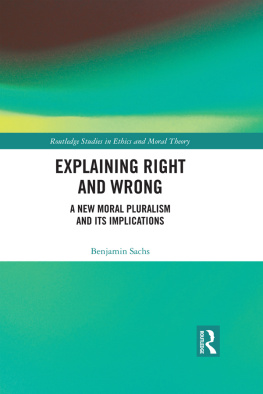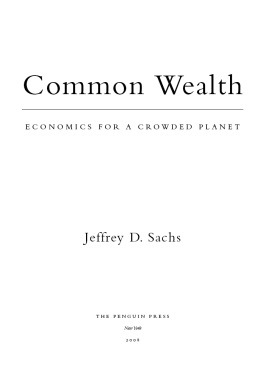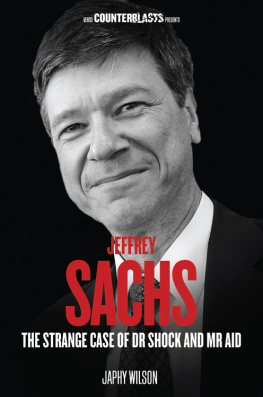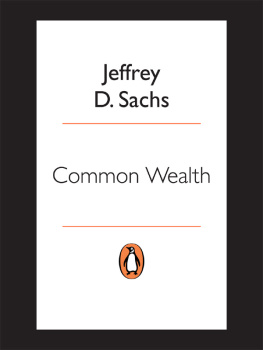Jeffrey D. Sachs - The Price of Civilization: Reawakening American Virtue and Prosperity
Here you can read online Jeffrey D. Sachs - The Price of Civilization: Reawakening American Virtue and Prosperity full text of the book (entire story) in english for free. Download pdf and epub, get meaning, cover and reviews about this ebook. year: 2011, publisher: Random House, genre: Politics. Description of the work, (preface) as well as reviews are available. Best literature library LitArk.com created for fans of good reading and offers a wide selection of genres:
Romance novel
Science fiction
Adventure
Detective
Science
History
Home and family
Prose
Art
Politics
Computer
Non-fiction
Religion
Business
Children
Humor
Choose a favorite category and find really read worthwhile books. Enjoy immersion in the world of imagination, feel the emotions of the characters or learn something new for yourself, make an fascinating discovery.

- Book:The Price of Civilization: Reawakening American Virtue and Prosperity
- Author:
- Publisher:Random House
- Genre:
- Year:2011
- Rating:5 / 5
- Favourites:Add to favourites
- Your mark:
- 100
- 1
- 2
- 3
- 4
- 5
The Price of Civilization: Reawakening American Virtue and Prosperity: summary, description and annotation
We offer to read an annotation, description, summary or preface (depends on what the author of the book "The Price of Civilization: Reawakening American Virtue and Prosperity" wrote himself). If you haven't found the necessary information about the book — write in the comments, we will try to find it.
The Price of Civilization: Reawakening American Virtue and Prosperity — read online for free the complete book (whole text) full work
Below is the text of the book, divided by pages. System saving the place of the last page read, allows you to conveniently read the book "The Price of Civilization: Reawakening American Virtue and Prosperity" online for free, without having to search again every time where you left off. Put a bookmark, and you can go to the page where you finished reading at any time.
Font size:
Interval:
Bookmark:
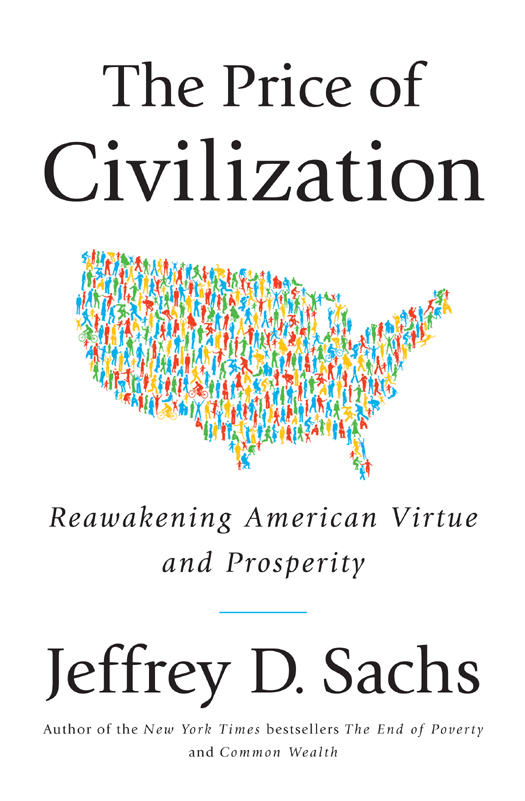
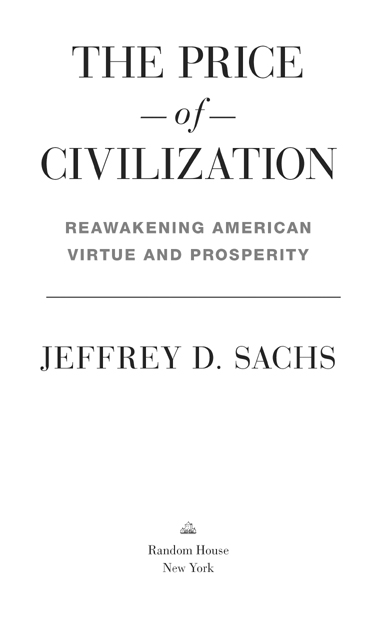
Copyright 2011 by Jeffrey Sachs
All rights reserved.
Published in the United States by Random House,
an imprint of The Random House Publishing Group,
a division of Random House, Inc., New York.
R ANDOM H OUSE and colophon are registered trademarks of Random House, Inc.
Library of Congress Cataloging-in-Publication Data
Sachs, Jeffrey.
The price of civilization / Jeffrey D. Sachs.
p. cm.
Includes bibliographical references.
eISBN: 978-0-679-60502-7
1. United StatesEconomic conditions2009 2. United StatesEconomic policy2009 3. Environmental responsibilityUnited States. 4. Social responsibility of businessUnited States. 5. United StatesPolitics and government21st century. I. Title.
HC106.84.S23 2011
330.973dc22 2011014631
www.atrandom.com
Jacket design: Pete Garceau
Jacket illustration Dreamstime Images
v3.1
The Great Crash
Diagnosing Americas Economic Crisis
At the root of Americas economic crisis lies a moral crisis: the decline of civic virtue among Americas political and economic elite. A society of markets, laws, and elections is not enough if the rich and powerful fail to behave with respect, honesty, and compassion toward the rest of society and toward the world. America has developed the worlds most competitive market society but has squandered its civic virtue along the way. Without restoring an ethos of social responsibility, there can be no meaningful and sustained economic recovery.
I find myself deeply surprised and unnerved to have to write this book. During most of my forty years in economics I have assumed that America, with its great wealth, depth of learning, advanced technologies, and democratic institutions, would reliably find its way to social betterment. I decided early on in my career to devote my energies to the economic challenges abroad, where I felt the economic problems were more acute and in need of attention. Now I am worried about my own country. The economic crisis of recent years reflects a deep, threatening, and ongoing deterioration of our national politics and culture of power.
The crisis, I will argue, developed gradually over the course of several decades. We are not facing a short-term business cycle downturn, but the working out of long-term social, political, and economic trends. The crisis, in many ways, is the culmination of an erathe baby boomer erarather than of particular policies or presidents. It is also a bipartisan affair: both Democrats and Republicans have played their part in deepening the crisis. On many days it seems that the only difference between the Republicans and Democrats is that Big Oil owns the Republicans while Wall Street owns the Democrats. By understanding the deep roots of the crisis, we can move beyond illusory solutions such as the stimulus spending of 20092010, the budget cuts of 2011, and the unaffordable tax cuts that are implemented year after year. These are gimmicks that distract us from the deeper reforms needed in our society.
The first two years of the Obama presidency show that our economic and political failings are deeper than that of a particular president. Like many Americans, I looked to Barack Obama as the hope for a breakthrough. Change was on the way, or so we hoped; yet there has been far more continuity than change. Obama has continued down the well-trodden path of open-ended war in Afghanistan, massive military budgets, kowtowing to lobbyists, stingy foreign aid, unaffordable tax cuts, unprecedented budget deficits, and a disquieting unwillingness to address the deeper causes of Americas problems. The administration is packed with individuals passing through the revolving door that connects Wall Street and the White House. In order to find deep solutions to Americas economic crisis, well need to understand why the American political system has proven to be so resistant to change.
The American economy increasingly serves only a narrow part of society, and Americas national politics has failed to put the country back on track through honest, open, and transparent problem solving. Too many of Americas elitesamong the super-rich, the CEOs, and many of my colleagues in academiahave abandoned a commitment to social responsibility. They chase wealth and power, the rest of society be damned.
We need to reconceive the idea of a good society in the early twenty-first century and to find a creative path toward it. Most important, we need to be ready to pay the price of civilization through multiple acts of good citizenship: bearing our fair share of taxes, educating ourselves deeply about societys needs, acting as vigilant stewards for future generations, and remembering that compassion is the glue that holds society together. I would suggest that a majority of the public understands this challenge and accepts it. During my research for this book, I became reacquainted with my fellow Americans, not only through countless discussions but also through hundreds of opinion surveys on, and studies of, American values. I was delighted with what I found. Americans are very different from the ways the elites and the media pundits want us to see ourselves. The American people are generally broad-minded, moderate, and generous. These are not the images of Americans we see on television or the adjectives that come to mind when we think of Americas rich and powerful elite. But Americas political institutions have broken down, so that the broad public no longer holds these elites to account. And alas, the breakdown of politics also implicates the broad public. American society is too deeply distracted by our media-drenched consumerism to maintain the habits of effective citizenship.
I am a macroeconomist, meaning that I study the overall functioning of a national economy rather than the workings of one particular sector. My operating principle is that the economy is intimately interconnected with a much broader drama that includes politics, social psychology, and the natural environment. Economic issues can rarely be understood in isolation, though most economists fall into that trap. An effective macroeconomist must look at the big canvas, in which culture, domestic politics, geopolitics, public opinion, and environmental and natural resource constraints all play important roles in economic life.
My job as a macroeconomic adviser during the past quarter century has been to help national economies function properly by diagnosing economic crises and then correcting breakdowns in key sectors of the economy. To do that job well, I must strive to understand in detail how the different parts of the economy and society both fit together and interact with the world economy through trade, finance, and geopolitics. Beyond that, I must also strive to understand the publics beliefs, the countrys social history, and the societys underlying values. All of this requires a broad and eclectic set of tools. Like other economists, I pore over charts and data. In addition, I read stacks of opinion surveys as well as cultural and political histories. I compare notes with political and business leaders and visit factories, financial firms, high-tech service centers, and local community organizations. Sound ideas about economic reform must pass a truth test at many levels, making sense at the community level as well as the national political level.
Font size:
Interval:
Bookmark:
Similar books «The Price of Civilization: Reawakening American Virtue and Prosperity»
Look at similar books to The Price of Civilization: Reawakening American Virtue and Prosperity. We have selected literature similar in name and meaning in the hope of providing readers with more options to find new, interesting, not yet read works.
Discussion, reviews of the book The Price of Civilization: Reawakening American Virtue and Prosperity and just readers' own opinions. Leave your comments, write what you think about the work, its meaning or the main characters. Specify what exactly you liked and what you didn't like, and why you think so.

